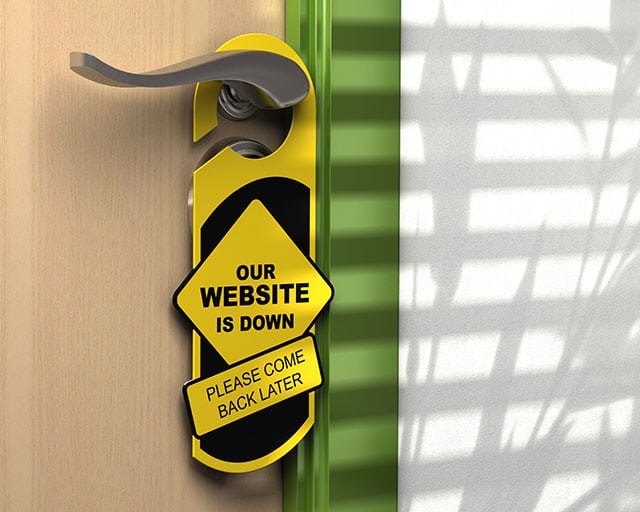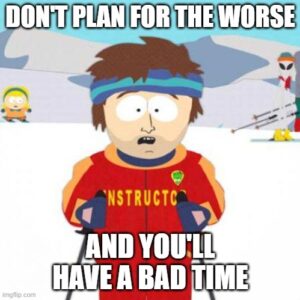
It’s pretty well understood that if your website takes too long to load your customers will become impatient and venture elsewhere. An estimated 15% of visitors will leave after a mere two seconds!
Consider how little time two seconds really is. Think about a site that will not load at all. Now, you understand why a website crashing just isn’t an option for an online business presence.
Let’s visit some of the reasons why your website might crash or go offline and how you can fix them, or maybe even avoid them altogether.
Website Viruses
Virus attacks are common and can bring down a website instantly. While some attacks come from actual people, most are bots crawling all over the internet searching for websites they can access and compromise.
If your website is vulnerable, the bot can access your code and take your site down in a flash. Bots are indiscriminate and will take down the first website it gets access to.
Don’t make it easy for them. The following will help you keep the bots out…
- Have a password protocol. Make sure anyone with access to the CMS or website backend uses strong passwords and changes them often. You can use a tool like the Strong Password Generator.
- Limit the access points into the website and the people with access to those points.
- If you have a WordPress website, change the login link to something other than /wp-admin
- Use security software with intrusion protection
Coding Issues
Sometimes your website will crash simply because your code is broken. Maybe you modified something incorrectly when you were making edits, or maybe there was a conflict when upgrades were being installed.
Sometimes these are easy to fix or can be overwritten with a backed-up version of the site, but some are much more serious and require specialized attention.
If your website is older, you may want to have someone perform a code review.
Plugin Errors
Plugins are commonly used on websites to inject additional features into your site’s base programming.
Specialized content and functionality that might require hours of coding on your website can be added in short order by simply installing a plugin.
The problem with using plugins is compatibility. Since the developer of the plugin may be different than the developer of your site/theme, the code is also different and that can sometimes create conflicts and coding issues, which can in turn bring your site down.
A few things you can do to mitigate the risks that come with plugins are…
- Make regular backups of your website, preferably off-site (locally and in the cloud)
- Research the plugins and make sure they are updated regularly and are highly rated
- Limit the use of plugins (do you really need that functionality?)
- Have a plan in place to update plugins, including a website backup, and testing
Smart use of plugins will save you time, money, and headaches.
Hosting Issues
Congratulations! Your site is very active and is getting more and more traffic each day, great!
However, increased traffic can be a problem if your hosting provider doesn’t have adequate space or bandwidth to handle that traffic.
If your host can’t accommodate the increase in traffic, your website could crash and would no longer be available. This post on selecting a hosting provider will help you make smart hosting choices.
Domain Issues
Think of your domain as the street address for your website. The difference, of course, is that your website address can expire.
When that happens, your site disappears too. We’ve seen this happen all too often. This is valuable time and potential customers lost. The unfortunate thing is that it’s easily avoided.
Renewing your domain can often resolve the issue, but setting your domain to auto-renew is a more proactive measure. Just make sure that you keep your domain account login handy and that your payment method on that account is valid.
A regular check of this is never a bad idea.
Hackers
Hackers are programmers trying to break into and access your site. There are many ways someone can hack into a site, but the most common is called a DDoS, or Distributed Denial of Service attack.
This means the individual overwhelms your site with too much traffic and overloads your bandwidth. Your website will crash if your hosting provider is not prepared for this amount of traffic.
Follow the same steps for viruses to limit potential access to your website. Also, make regular backups and host with a provider who can handle a hacking event.
What Can Be Done Once My Website Crashes?
The first thing that you should do is contact your hosting provider. If they can’t help with the issue directly, they will be able to give you information on what the problem is and point you towards someone who can help.
Every website will experience downtime at some point. The best way to minimize this downtime is to have a reliable and responsive provider that can assist with your issues when they arise and implement procedures that will prevent some of these factors before they can happen.
Be overly cautious and have several backup measures in place and you will have a better time if your website ever goes down.

Are you worried that you might not have planned for the worse? We can help. Drop us a line or give us a call at 301.383.8351.